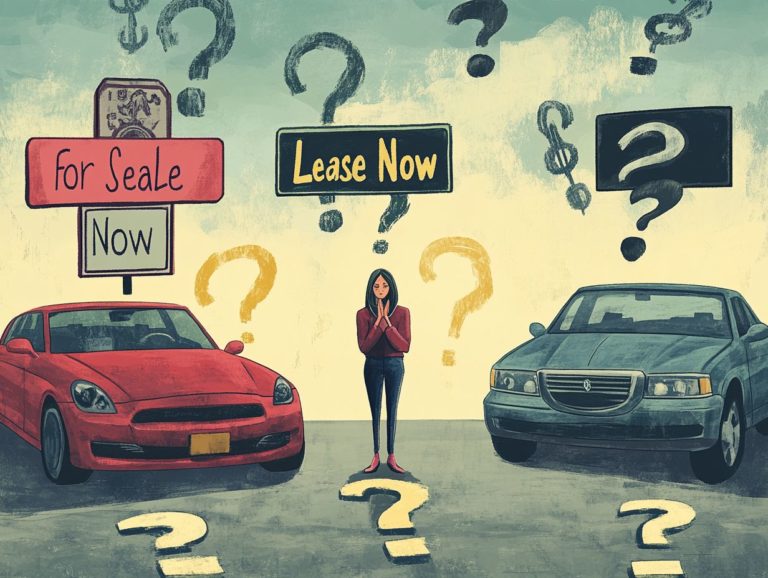How to Handle Buyer’s Remorse?
Buyer s remorse is a familiar experience that many encounter after making a significant purchase. It often arises from various emotional and psychological factors, prompting you to second-guess your decisions.
This article delves into the definition and causes of buyer’s remorse, identifies common triggers, and offers practical tips for coping and moving forward. You ll also discover strategies aimed at preventing this feeling from arising in the first place, as well as insights on when it might be wise to seek assistance.
Whether you ve just acquired a new car or indulged in a luxury item, understanding buyer’s remorse will empower you to make more confident purchases in the future.
Contents
Key Takeaways:
- Buyer s remorse is a common reaction.
- It can stem from regret, fear, and self-doubt.
- Copes by reframing thoughts and seeking support.
- Prevent it by researching, budgeting, and avoiding impulse buys.
Understanding Buyer’s Remorse
Understanding buyer’s remorse is essential as you navigate the shopping world, particularly during pivotal events like Black Friday and Cyber Monday. This strong emotional reaction can hit hard, especially after an impulsive buy!
Often, it arises from impulse purchases, resulting in regret and disappointment over financial choices that may not align with your budget or expectations.
The phenomenon of buyer’s remorse is shaped by various influences, including persuasive marketing strategies, peer pressure, and the allure of retail therapy. These factors can profoundly affect your spending habits and overall mental well-being.
Definition and Causes
Buyer s remorse refers to that nagging feeling of regret you experience after making a purchase, especially when driven by impulse. This emotional turmoil often arises from a mix of factors.
You may wrestle with unmet emotional needs, leading to hasty decisions in pursuit of instant gratification rather than long-term satisfaction.
Financial considerations also play a crucial role. When you stretch your budget or overlook essential expenses to acquire something you desire, the reality of your financial situation can spark doubt.
Regret can deepen as you compare your purchase to what else you could have spent your money on, adding layers to your emotional struggle. Understanding these psychological nuances is essential for navigating your buying decisions wisely.
Common Triggers of Buyer’s Remorse
Common triggers of buyer’s remorse often lie in emotional and psychological factors that shape your shopping experiences.
Elements like anxiety and unrealistic expectations can significantly influence your decisions, leading to that all-too-familiar feeling of regret after a purchase.
Emotional and Psychological Factors
Emotional and psychological factors significantly influence buyer’s remorse, often surfacing as anxiety or confusion when your purchase doesn’t meet your expectations. This phenomenon frequently follows impulsive buying decisions, where the immediate thrill of ownership clashes with the stark reality of dissatisfaction.
For instance, when you splurge on a luxury handbag, the initial excitement may soon give way to nagging doubts about affordability, resulting in uncomfortable feelings of regret. You may grapple with the desire for the item while recognizing that you might have overspent or made a questionable choice.
These emotions can drive you to seek justification, perhaps by downplaying the negatives or rationalizing the purchase, complicating your emotional landscape even further.
Dealing with Buyer’s Remorse
Navigating buyer’s remorse calls for effective coping strategies that can greatly enhance your overall experience and shape your future financial decisions.
By implementing these strategies, you can transform a moment of doubt into an opportunity for growth and informed choices.
Tips for Coping and Moving On
Coping with buyer’s remorse requires you to recognize your emotional needs and employ strategies that lead to financial peace and manageable spending.
Take a moment to step back and evaluate not just the purchase itself but also the emotions tied to it. Reflect on the reasons behind that impulse buy, whether it’s stress or societal pressure. Acknowledging these triggers can significantly reduce their influence on your future decisions.
Consider creating a reflection journal where you can articulate your thoughts about the purchase. This practice can be invaluable for processing your emotions.
Establish a budgeting guideline that includes a cooling-off period before making larger purchases. This approach allows for thoughtful evaluation rather than snap decisions, ultimately fostering both emotional recovery and enhanced financial stability.
Preventing Buyer’s Remorse
Preventing buyer’s remorse is all about empowering yourself to make confident purchases. By engaging in knowledge-based decision-making and effective budget planning, you set the stage for positive shopping experiences.
When you take the time to research and strategize, you elevate your ability to invest wisely. Ensure that each purchase aligns with your values and needs. This thoughtful approach transforms your buying journey into one that brings satisfaction instead of regret.
Strategies for Making Confident Purchases
Strategies for making confident purchases include establishing a budget, evaluating product descriptions, and considering customer loyalty programs.
Create a savings plan to handle unexpected costs. This will help you navigate spending more effectively. Conduct thorough research before making a purchase, utilize comparison tools, and carefully read reviews to understand product quality and user experiences.
Taking advantage of customer loyalty programs not only leads to discounts but also cultivates long-term benefits that can offset your expenses. By approaching spending with insight and forethought, you can effectively mitigate buyer’s remorse and ensure that your purchases align with your financial goals and personal needs.
When to Seek Help for Buyer’s Remorse
Understanding when buyer’s remorse escalates into a serious concern is crucial for preserving your emotional well-being. Lingering feelings of regret and anxiety can become difficult to shake off.
Recognizing When it Becomes a Problem
Recognizing when buyer’s remorse transforms into a significant issue involves identifying ongoing feelings of stress, such as anxiety and overwhelming regret. These feelings can linger long after a purchase, creating ongoing stress that seeps into your daily life.
It s essential to tune into your emotional responses and notice if negative thoughts become a constant companion. These can lead to sleepless nights or difficulty concentrating.
To seek help, consider reaching out to a mental health professional who can equip you with effective strategies for managing anxiety. Engaging in conversations with friends or joining support groups can offer fresh perspectives.
Practicing simple mindfulness techniques can be invaluable in addressing these feelings and promoting emotional balance following your purchasing decisions.
Frequently Asked Questions
What is buyer s remorse and why does it occur?
Buyer s remorse is the feeling of regret or guilt that a person experiences after making a purchase. It can occur for a variety of reasons, such as feeling like you spent too much money, realizing you could have gotten a better deal, or simply doubting whether the item was a necessary purchase.
Is buyer s remorse a common experience?
Yes, buyer s remorse is a very common experience. In fact, a study by the National Retail Federation found that nearly 80% of shoppers experience buyer s remorse at some point.
How can I prevent buyer s remorse?
There are a few strategies that can help prevent buyer s remorse. It s important to do your research and compare prices before making a purchase. Also, ask yourself if the item is something you really need or if it s just an impulse buy. Additionally, consider waiting 24 hours before making a purchase to give yourself time to think it over.
Reflect on your purchases and share your experiences in the comments below to create a more interactive feel.
What should I do if I experience buyer s remorse?
Recognize how you feel and figure out why. If you can return the item, think about doing it. Otherwise, find ways to enjoy your purchase.
How can I handle buyer s remorse with big-ticket items?
Always do your research before buying big-ticket items. Ask yourself if it s worth the cost and explore alternatives. If buyer s remorse hits, remember you can negotiate a return or exchange.
Is it normal to feel buyer s remorse even after returning an item?
Yes, it s common. It might take time to feel better about your choice, so focus on the benefits of returning, like saving money or clearing clutter. If the feelings linger, talk to a friend or consider seeking support.


